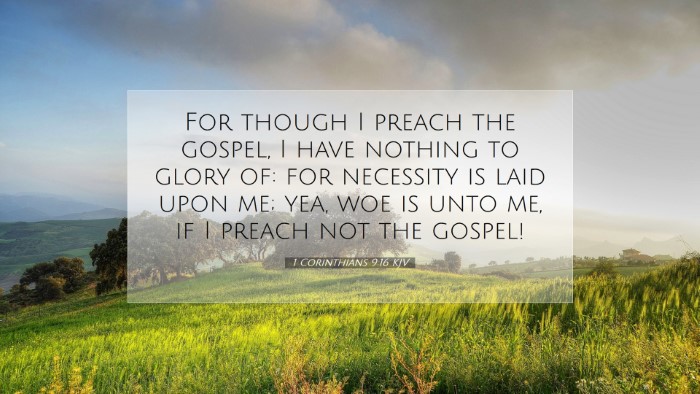Commentary on 1 Corinthians 9:16
In the epistle to the Corinthians, the Apostle Paul addresses a key aspect of his ministry, emphasizing the necessity and urgency of preaching the Gospel. 1 Corinthians 9:16 serves as a pivotal statement that captures his sense of compulsion in proclaiming the message of Christ.
Verse Analysis
Text of the Verse: "For if I preach the gospel, I have nothing to boast of, for necessity is laid upon me; yes, woe is me if I do not preach the gospel!" (1 Corinthians 9:16, NKJV).
Paul's Bound Obligation
Paul begins by stating, "For if I preach the gospel, I have nothing to boast of..." This indicates that his call to preach is not a matter of pride or personal achievement; rather, it is a divine mandate. Matthew Henry notes that Paul recognized preaching as a sacred duty, necessary for fulfilling God's purpose.
"The work of preaching was laid upon him as a solemn charge," Henry writes, emphasizing that it is not merely a profession but a divinely appointed responsibility. The preacher's task is framed within the context of God's will, underscoring the weightiness of the gospel message.
The Compelling Necessity
Paul continues, declaring that "necessity is laid upon me." Here, he reflects a profound sense of compulsion. Adam Clarke elaborates on this sentiment: "The word necessity signifies that he felt an inward anguish, an urgent need to fulfill his calling." This necessity indicates a profound spiritual burden that compels him to be faithful to his commission.
Woe is Me if I Do Not Preach
The phrase "woe is me if I do not preach the gospel" reflects the seriousness of failing to fulfill his calling. Albert Barnes interprets this as a reminder of the dire consequences of neglecting such a great responsibility. Paul is acutely aware that to remain silent about the gospel is to forsake the souls that are in need of salvation.
Theological Implications
This verse carries significant theological weight regarding the nature of Christian ministry. Firstly, it shows the necessity of divine calling and the imperative nature of preaching. Those engaged in ministry must understand that their work transcends human effort; it is significantly divine at its core.
Indebtedness to the Gospel
Theologians often discuss the theme of indebtedness in relation to the gospel. Just as Paul expresses his feeling of obligation, ministers today must seek to emulate his understanding of being bound to declare the good news of Jesus Christ. It is stated succinctly in Barclay's commentary that Paul felt he owed the gospel to God because of the grace he had received.
A Model for Ministry
In light of Paul's feelings of necessity, he serves as a model for contemporary pastors and theologians. The fervency with which he proclaims the message calls into question the motivations behind modern preaching. Are ministers preaching out of a sense of obligation fueled by love for Christ and commitment to His service?
Encouragement for Pastoral Work
The pastoral vocation, like that of Paul, demands a deep commitment and a fervent spirit. As Henry states, "For what will it profit a man to gain the whole world, and lose his own soul?" Pastors are called to prioritize spiritual matters over earthly pursuits, recognizing that the welfare of souls is paramount.
Conclusion: The Urgency of the Gospel
In summary, 1 Corinthians 9:16 encapsulates the essence of apostolic ministry characterized by a profound sense of compulsion and obligation. Paul’s words serve not just as a reflection of his personal feelings but as a higher call to all who proclaim the gospel. Understanding this can enrich our commitment to preaching and remind us of the eternal significance of sharing God’s truth.
May all who engage in the work of ministry be reminded of the great honor and responsibility that comes with preaching the Gospel, thus carrying forth the message with the same passion and urgency displayed by the Apostle Paul.


